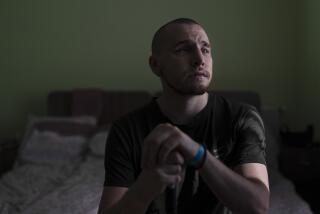Ex-Soldiers Share Same Fear in Peace : The Muslim
- Share via
SARAJEVO, Bosnia-Herzegovina — A palm-sized Browning pistol is in his right front pocket and a Czech-made 7.65-mm Zbrojevka is shoved behind his belt. They are always there, like the frayed nerves and restlessness he brought back from war.
“I’ve become someone I don’t know: Who is this guy?” says Armin Colak, running willowy fingers over his close-cropped hair. Some strands are gray. Colak is 21.
He joined the army the first day the Bosnian government asked for soldiers in 1992. He left his commando unit in November and enrolled in college to study political science. A simple lecture, however, is a test of stamina.
“I try to sit. I’m trying very hard, but I just can’t stay still anymore. . . . I can’t even sit still for 45 minutes for a class. The teacher’s talking, but it’s just words.”
Colak can’t stay home, either. He gets up early and leaves right away. He can’t stand his mother’s tears and melancholy. Colak’s father was killed by a mortar shell in June 1993. By the time Colak could return to Sarajevo, the funeral was over.
“I’m the man in the house and expected to get a job, get some money,” says Colak, who lives with his mother and 25-year-old sister. “There’s nothing I can do. I just know I can’t be home.”
Before the war, Colak worked as a DJ in a dance club. Now, he can’t bear to listen to music. His school books--any book--is beyond his concentration.
“My biggest wish is just to understand what’s going on with me,” he says. “I feel like a stranger to myself.”
He pats his pistols.
“I don’t feel comfortable without them.”
The Serb
PALE, Bosnia-Herzegovina--Darko Stanisic was the model fighter when the war opened: ready to kill for the “birth of a real Serb state.”
He is now the archetypal forlorn warrior. The 25-year-old former autoworker is tired of war but a stranger to peace.
“I wake up every morning and the first thing I do is to grab my uniform and my pistol. Then I realize I don’t need them anymore. . . . I need time to get rid of the war habits,” he says in Pale, the self-proclaimed Bosnian Serb capital about 9 miles southeast of Sarajevo.
He sees himself as a war casualty--the type inflicted on the psyche rather than the flesh.
“Out of the blue, the peace came. And it came faster than the war had broken out. I was prepared for the war in Bosnia, but the peace took me by surprise,” he says.
“What shall I do in peacetime? I didn’t finish my education. There are no jobs.”
But he fears even more going back to the battlefield.
“I’m still afraid it’s not for real. It seems like a dream. Sometimes I think I’ll wake up in a trench under fire, covered with mud and scared to death.”
More to Read
Sign up for Essential California
The most important California stories and recommendations in your inbox every morning.
You may occasionally receive promotional content from the Los Angeles Times.












